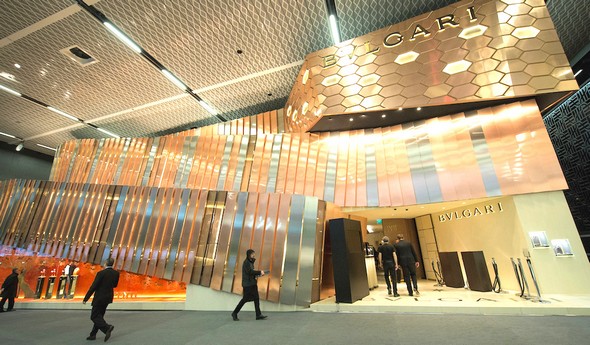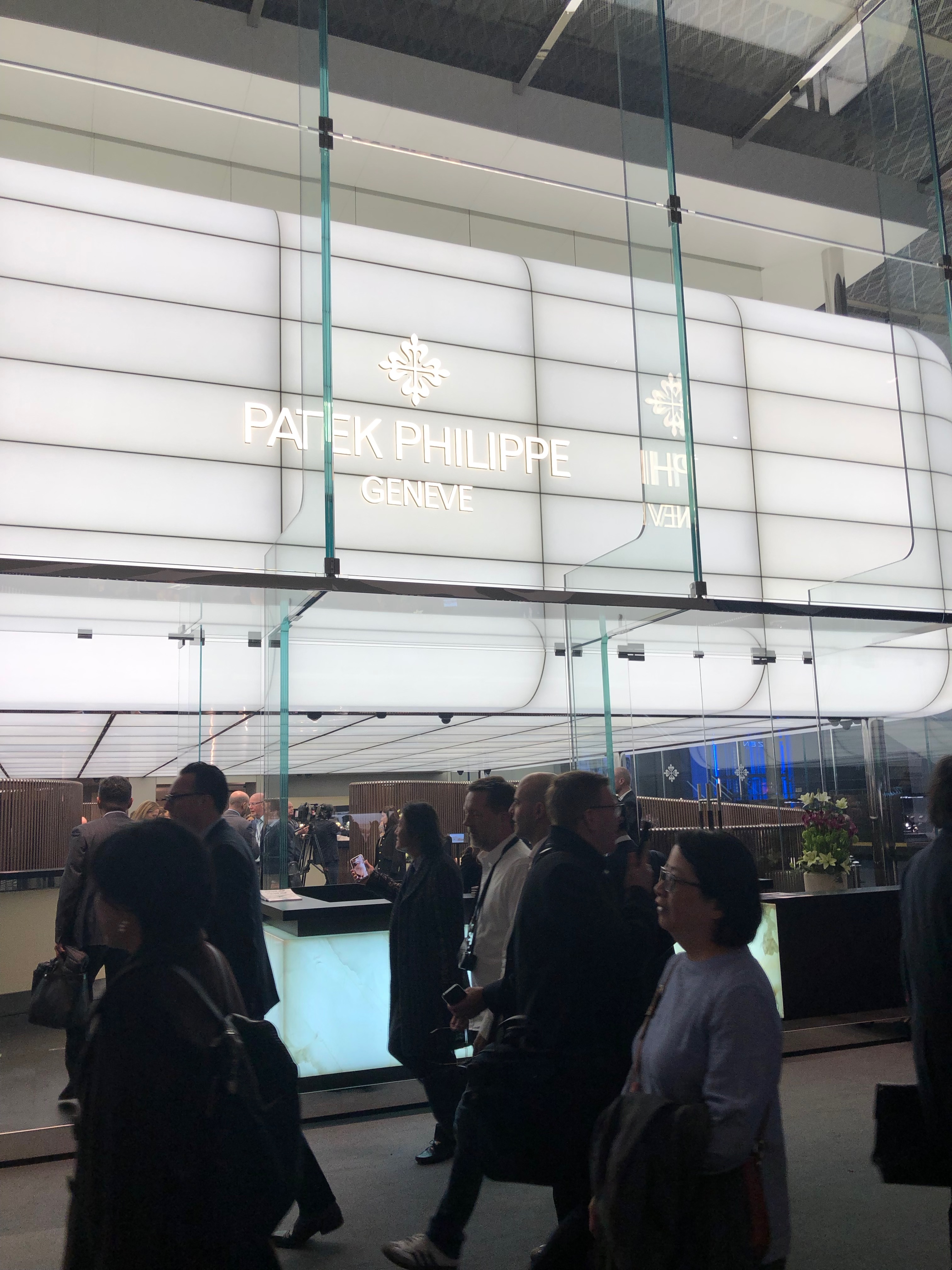
Baselworld press conference platform
Well it’s been a hell of a week for Baselworld. Not only did Rolex, Patek Philippe, Chopard, Chanel and Tudor — the main anchor brands of the annual fair — exit the show, but also, as of today, the last key “main hall” brands owned by the LVMH Group — TAG Heuer, Hublot and Zenith — also announced their leave. Oddly enough, none of it came as a huge surprise. If you had your ear to the ground for the past six months, you would have known that Rolex and Patek and Chopard were talking. If you paid attention to the fact that LVMH had its own summit earlier this year, and that almost immediately thereafter big-brand Bulgari pulled out of Baselworld — you would have guessed the departure of the other LVMH brands. The thing is, though, we are all left wondering: did Baselworld’s organizers, the MCH Group, cause this downhill spiral thanks to mismanagement? Other questions also arise in this new era of the Baselworld blues. Among them: Will Baselworld become a jewelry show instead of a watch show? Will Baselworld go back to its roots and become a small-brand, small-booth show? Will it even survive at all in any format?

Bulgari at Baselworld 2019
LVMH Leaves Baselworld
I actually found the wording of the LVMH announcement pretty interesting. After stating that the watch brands heard the news of the other five brands, including the three giants, Rolex, Patek and Chopard, leaving, the announcement went on to say: “Within this context of clearly weakened representation of the Swiss watch industry and hence inevitably lower participation, it appears clear to the brands composing the Division and to the House of Bvlgari that they must also withdraw in order to preserve their image and their relations with their clients as well with the media. They will therefore not be taking part in the 2021 edition of Baselworld.”
Bulgari had already noted it would not partake in 2021, and how does leaving Baselworld preserve the image of the other three brands? I get it that the show is weakened and that with so many of the big brands out, many retailers and press may not venture to Basel — especially given the price-gouging of the hotels and restaurants during the exhibition time frame. But I don’t think exhibiting or not exhibiting there will affect the image of the brands.
I think the more important point here is that the LVMH Group — as well as the other big brands who fled — recognize that it is time for a change. It is time for all of the brands to come together and showcase their products in one city at one time to make it easier on all involved. Additionally, there is strength in numbers and there is strength in solidarity.
Stephane Bianchi, CEO of the Watchmaking Division of LVMH, said it best: “We are facing an opportunity to reinvent the format and content of one of the key moments of our watchmaking year, which represented both a major commercial challenge and a lever of influence for our brands. With this in mind, we will do our utmost to be present alongside the other prestigious Maisons that will gather in Geneva in April 2021, and thereby meet the requirements of our partners and clients while offering them an unrivaled experience.”
I believe that the entire watchmaking community, the journalists and retailers, as well, are looking forward to learning what the new show may be next year and which brands, ultimately, will participate. We can already be sure that some brands will go rogue — taking space in hotels in the city to showcase their timepieces, as has been going on for decades. But still, at least it is all in one fairly easy-to-navigate city.

Patek Philippe at Baselworld 2019
Price-Gouging and Free Hotel Rooms
A friend and colleague of mine recently asked why everyone was bashing Baselworld and not Watches & Wonders Geneva (formerly SIHH). It is a fair question. However, most of us are not privy to the behind-the-scenes battles between exhibitors and organizers at Baselworld, so the answers may elude us. We can’t blame the Fair for the price gouging that the hotels and restaurants implement during the show season. The same price gouging takes place in Geneva during the peak show season, though on a smaller scale. After all that city is just much more expensive than Basel. The same room in the Hotel President Wilson, for instance, that we pay about $750 a night for during show season goes for about $470 a night in other seasons. For many of us, though, the hotel prices don’t matter too much, since the Watches & Wonders Geneva show organizers typically foot much of that bill. Will this continue to be the case? If there are other concurrent shows happening around the city during that event, with the big brands of Rolex, Patek, LVMH Group and others exhibiting, will they invite the journalists and retailers at their expense? Somehow, I doubt it.

Inside Hall 1.0 at Baselworld 2019 just hours before the show officially opened.
Did Baselworld Dig Its Own Grave?
So, with all the talk being about Geneva in April 2021, will there even be a Baselworld in January 2021? Honestly, with there not yet being a vaccine for COVID-19, the entire timing may not work. But if we put the virus aside for a moment (wouldn’t that be refreshing?), can Baselworld survive and what would it look like? The entire main hall is practically decimated now. The show had already had to reorganize the halls last year when all of the Swatch Group brands left. Now, walking into Hall1 without Rolex, Patek Philippe, Chopard, Tudor, Bulgari, TAG Heuer, Hublot, and others means the starting point would be three-quarters of the way down the hall — at Carl F. Bucherer, Bell & Ross, Oris and further back. Even at that, some of the brands that were at the back and upstairs have also left the show. Gucci, for instance, as well as the Japanese brands of Citizen and Seiko. It is possible the Japanese brands may come back – as they each cited the virus and a conflict in timing – as their reasons for leaving.
Still, if Baselworld brought the folks in the back of the hall to the front, and brought the big jewelry brands from upstairs, including companies like Graff and Roberto Coin, downstairs to the main hall — it could salvage the show and maybe even spin it back into a jewelry show. Maybe if it wrangled deals with smaller brands, jewelry houses, and maybe even brings back loose stone dealers, it could survive. But the key to it all: the organizers must lowere prices drastically and become incredibly accommodating to exhibitors. It seemed the new management was on that course — putting together panel discussions, asking for exhibitor feedback, and more. But then, during a critical time frame — especially given the dire global economics — it refused to issue refunds. While I agree that the big brands had already been discussing leaving in the show – and doing so in tandem – the refusal to refund became the perfect scapegoat platform for the announcement to be made. I mean, how in the world could the fair not issue refunds for a 2020 show that isn’t happening?
More importantly, though, the message given by all of the brands leaving Baselworld is simple: whatever management was doing was just not enough.
What happens next remains to be seen. There is a saying that the grass is always greener on the other side. We will have to wait and see if it is.

The iconic fountain on Lake Geneva.





